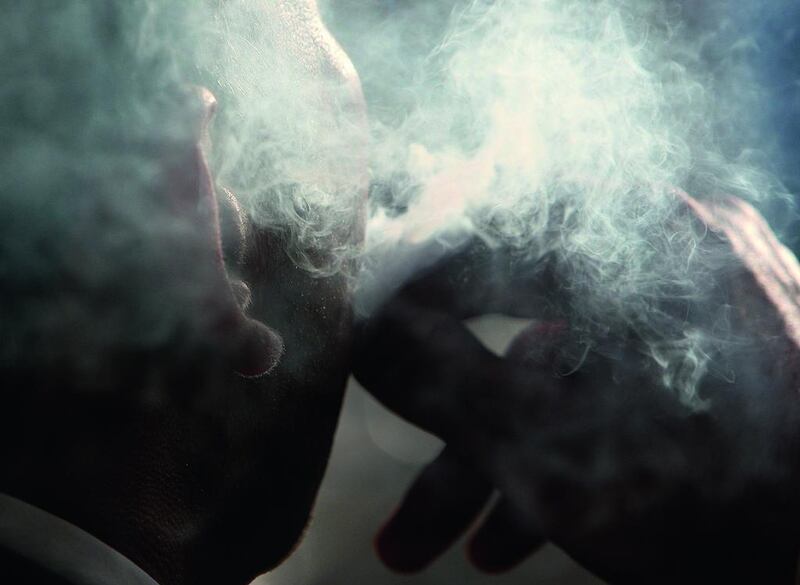No one likes to talk about the C-word, but with lung cancer causing more deaths globally than any other type of cancer, for many it is an unavoidable discussion.
On May 31, the World Health Organization will mark the 29th annual World No Tobacco Day, and given the region’s well-documented appetite for smoking, the clock is ticking on education and prevention awareness.
“Lung cancer has one of the lowest survival rates of any cancers because it is often detected in its later stages, which underscores how important it is to get screened regularly, particularly if you are a smoker,” says Ali Wahla, staff physician in the Pulmonology, Respiratory and Critical Care Institute at Cleveland Clinic Abu Dhabi.
“The most recent research shows a five-year survival rate of 49 per cent if it is detected early, compared to 1 per cent for late-stage cancer that has spread to other areas of the body,” he says.
WHO statistics for the Eastern Mediterranean, which includes the GCC states, Egypt and Jordan, shows high rates of tobacco use: 32 per cent among the age group of 15 and above, and 36 per cent among teenagers between the ages of 13 and 15, with usage among youth on the rise.
These figures are in direct contrast to the latest WHO Global Report on Trends in Tobacco Smoking, which says there are more non-smokers in the world than ever, with 81 per cent of the projected 6.1 billion global population (ages 15 and above) expected to shun tobacco by 2025.
Speaking last November at a specially convened seminar in Dubai to discuss targeted therapies, Dr Mohammed Jaloudi, chief of medical oncology at Tawam Hospital in Al Ain, reported an increase in the rate of lung cancer in the Emirates.
“The increase we see is due to many factors, such as ageing, continued population growth and widespread smoking habits,” he said.
According to Wahla, lung cancer is the second most common cancer among men in the UAE, and the fourth most common overall. “However, research has shown that incidence levels in the UAE are generally lower than in Europe, North America and some other GCC countries,” he says. “Some possible reasons for this may include under-diagnosis, under-reporting and an overall young population.”
Non-small cell lung cancer is the most common type, affecting about 85 per cent of people diagnosed with lung cancer.
“The most common lung cancers do have one trait in common, though: smoking and exposure to second-hand smoke is their single biggest risk factor,” says Wahla.
He advises smokers and former smokers, or those exposed to any other risk factors, to have regular screenings and check-ups to ensure abnormalities are caught early.
The UAE has been active in implementing anti-smoking legislation, which began in 2008 with the introduction of the smoke-free law for public places such as malls, airports and restaurants, and made designated smoking rooms a requirement.
In 2014, the federal anti-tobacco law came into effect, making it illegal to smoke in a vehicle in the presence of a minor, restricting tobacco purchases to those over 18, banning shisha cafes and tobacco supply stores from operating close to schools, mosques or residential areas, and prohibiting tobacco advertising of any kind.
For Akshay Barar, 33, a decade-long smoker, impending fatherhood gave him the motivation to quit.
“We were expecting our first child and I decided that I would stop completely before he came into the world. I went cold turkey overnight as I didn’t think I could stop by using any kind of substitute or by gradually cutting down,” he says.
The excitement and exhausting hands-on requirements of being a dad also helped him deal with the cravings. But once he resumed his social life it got more challenging.
“The urge to smoke was there, but although I occasionally chewed gum, I didn’t use any other substitutes, and it was just sheer willpower,” he says.
Barar hasn’t picked up a cigarette since quitting. “The first 60 days are really difficult, with mood swings and a short temper, but once you’ve passed the eight-week mark you turn a corner. I read a lot online about this, and it also helped me stick to my decision, along with the support of my wife.”
More than two years later, Barar says the benefits are obvious: “I have the Since iQuit app on my phone that tracks how I’m doing. I feel clean and energised, and when I work out I have much more stamina.”






